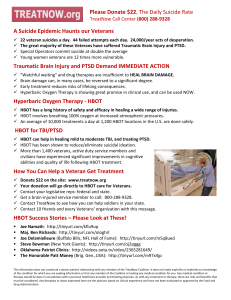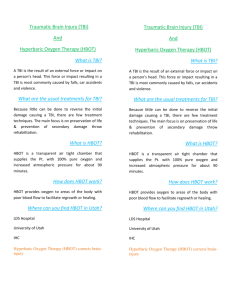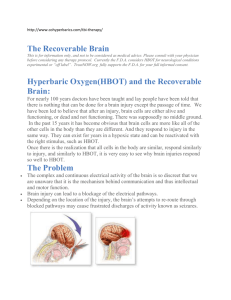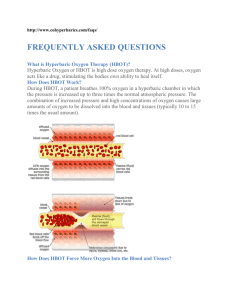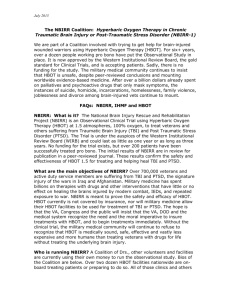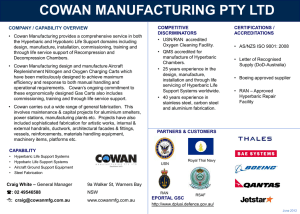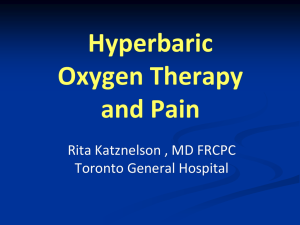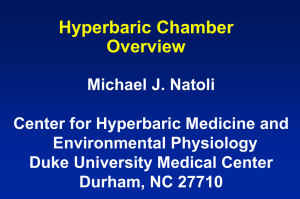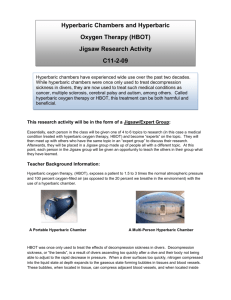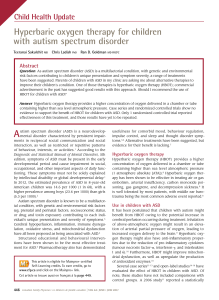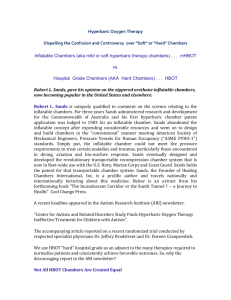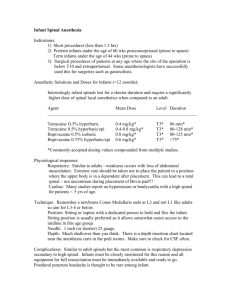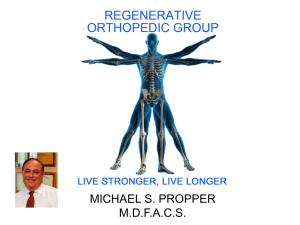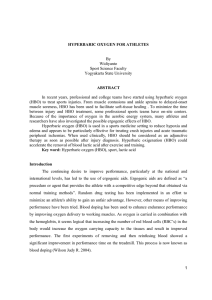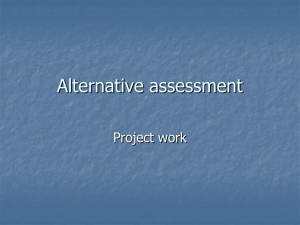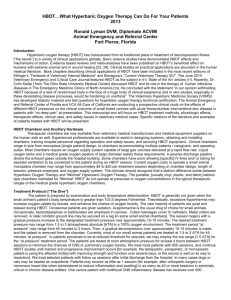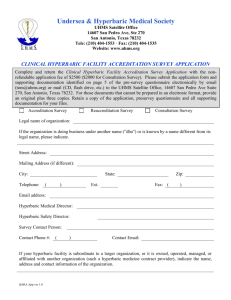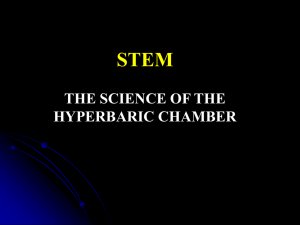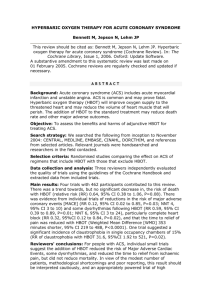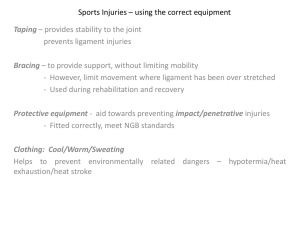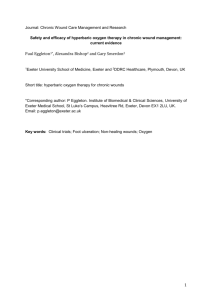K Paul Stoller, MD, FACHM Chief of Hyperbaric Medicine
advertisement
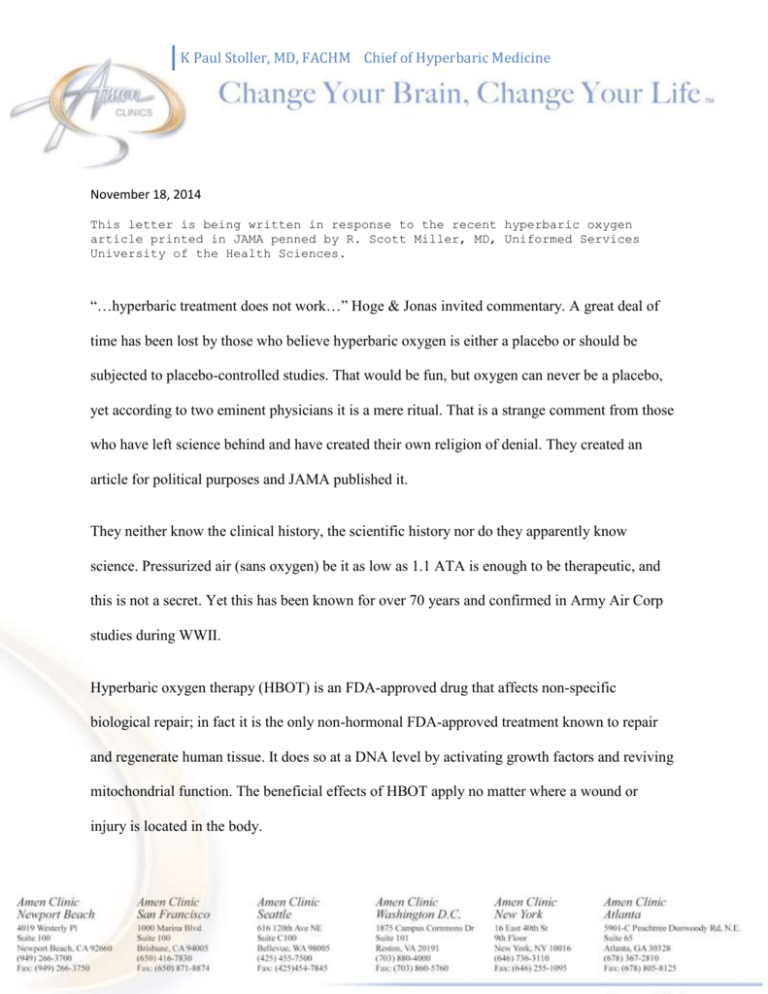
K Paul Stoller, MD, FACHM Chief of Hyperbaric Medicine November 18, 2014 This letter is being written in response to the recent hyperbaric oxygen article printed in JAMA penned by R. Scott Miller, MD, Uniformed Services University of the Health Sciences. “…hyperbaric treatment does not work…” Hoge & Jonas invited commentary. A great deal of time has been lost by those who believe hyperbaric oxygen is either a placebo or should be subjected to placebo-controlled studies. That would be fun, but oxygen can never be a placebo, yet according to two eminent physicians it is a mere ritual. That is a strange comment from those who have left science behind and have created their own religion of denial. They created an article for political purposes and JAMA published it. They neither know the clinical history, the scientific history nor do they apparently know science. Pressurized air (sans oxygen) be it as low as 1.1 ATA is enough to be therapeutic, and this is not a secret. Yet this has been known for over 70 years and confirmed in Army Air Corp studies during WWII. Hyperbaric oxygen therapy (HBOT) is an FDA-approved drug that affects non-specific biological repair; in fact it is the only non-hormonal FDA-approved treatment known to repair and regenerate human tissue. It does so at a DNA level by activating growth factors and reviving mitochondrial function. The beneficial effects of HBOT apply no matter where a wound or injury is located in the body. K Paul Stoller, MD, FACHM Chief of Hyperbaric Medicine Many peer-reviewed articles have been published in the last decade that demonstrates HBOT is effective at repairing an injured brain even long after that injury took place. This is all consistent with past-published reports of HBOT in chronic brain injury, including research by the US Army on brain-injured children from a decade ago. The first battle casualty to be treated with HBOT (there have been about 300 total), and one of the few to be treated was General Patt Maney (retired) for his blast-induced brain injury in Afghanistan. His treatment was ordered after 9 months of therapy at Walter Reed had shown minimal improvement. As a result of his injuries he was non-functional and unable to return to his job, let alone redeploy back to Afghanistan. After HBOT treatment he was discharged from Walter Reed and returned to his civilian job as a Florida state judge. He received treatment from George Washington University Medical Center at $250 per treatment. Counting lost time and hospital costs, his months at Walter Reed making no progress; the DoD spent $400,950, with a permanent disability loss to the service of $1.3 million. Had he received HBOT earlier, he would have been able to remain on active duty, a savings of $1.3 million, but more importantly, the 5 months of recovery once he began receiving HBOT cost $133,650, a savings to the government of $287,300. No other patients were treated at the Walter Reed's brain injury center, despite the General's remarkable recovery that everyone on the staff witnessed. The $20,000 for his hyperbaric medical treatment was $12,000 less than what a K Paul Stoller, MD, FACHM Chief of Hyperbaric Medicine RAND report states the annual ongoing costs per year of the current treatments for mild-TBI is, and that is a lot of SSRI’s (what the VA usually uses to treat TBIs). There are political issues and agendas at play here, perhaps fears that if HBOT became an accepted therapy for TBI/PTSD a huge percentage of the Army/Navy/and Marines might claim they too suffer from this and it would decimate the armed forces. To obfuscate the truth of such a benign and humanitarian therapy out of some insane fear to the point where orders have been given to disprove HBOT to be efficacious for treating TBI/PTSD is illegal. This is a medical, scientific and humanitarian travesty that needs to be rectified. Back in the 70’s when Capt. GB Hart, MD FACS (USN) was ordered to not include stroke as a covered condition for HBOT: “…one day this guy came to my office. He was a very, very, very senior government official, whose name you would recognize. He came into my office and pointed his finger at me and said, ʻYou will not, under any circumstance, approve Hyperbaric Oxygen Therapy for stroke.ʼ” “Why not, I said. It works.” “ʻI donʼt care,ʼ he said, ʻIʼm not going to let you do it.ʼ” “But it works, I said. You know it works.” “ʻI donʼt care, he said, itʼll break the bank, and Iʼm not going to let you do it. Youʼre not going to approve this for stroke, and thatʼs an order.ʼ” “An order?” I asked.” “I was an officer in the United States Navy. Iʼm retired now. I was given an order, and I had to obey it.” It appears very little has changed in the last 40 years. K Paul Stoller, MD, FACHM Chief of Hyperbaric Medicine
